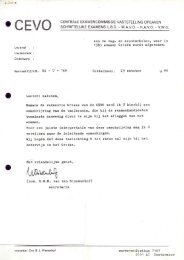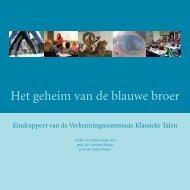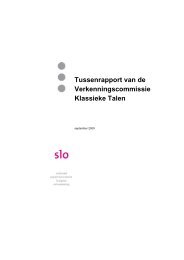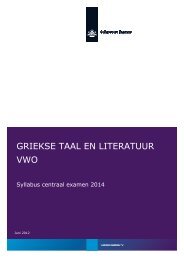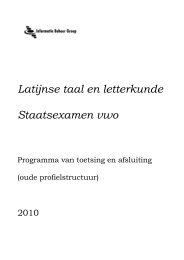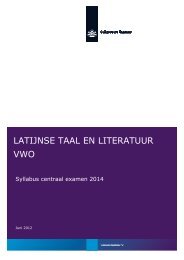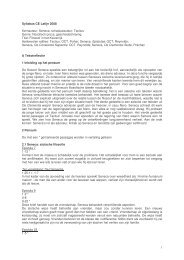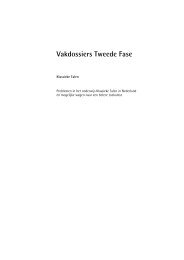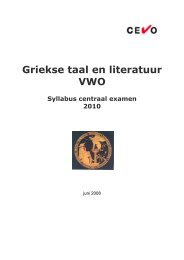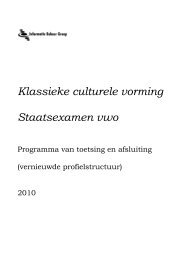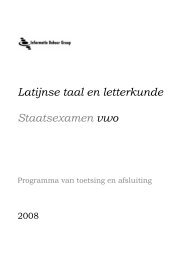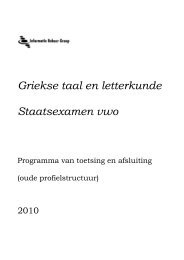Rome Wasn't Digitized in a Day - Council on Library and Information ...
Rome Wasn't Digitized in a Day - Council on Library and Information ...
Rome Wasn't Digitized in a Day - Council on Library and Information ...
You also want an ePaper? Increase the reach of your titles
YUMPU automatically turns print PDFs into web optimized ePapers that Google loves.
191<br />
groups, log analysis (the same <strong>on</strong>es used by the LAIRAH project for their research), Delphi 581<br />
forecast<str<strong>on</strong>g>in</str<strong>on</strong>g>g, <strong>and</strong> user trials. 582 In the f<str<strong>on</strong>g>in</str<strong>on</strong>g>al step of their process, RePAH used the results of the user<br />
trials where participants were presented with a range of possible portal features <strong>and</strong> a number of<br />
dem<strong>on</strong>strators to “cross-check” the earlier results of the focus groups, questi<strong>on</strong>naires, <strong>and</strong> Delphi<br />
exercise.<br />
A number of major f<str<strong>on</strong>g>in</str<strong>on</strong>g>d<str<strong>on</strong>g>in</str<strong>on</strong>g>gs emerged as a result of this research that illustrate larger themes that need<br />
to be c<strong>on</strong>sidered when design<str<strong>on</strong>g>in</str<strong>on</strong>g>g an <str<strong>on</strong>g>in</str<strong>on</strong>g>frastructure for any discipl<str<strong>on</strong>g>in</str<strong>on</strong>g>e with<str<strong>on</strong>g>in</str<strong>on</strong>g> the arts <strong>and</strong> humanities<br />
such as classics. They labeled <strong>on</strong>e major theme as “pull vs. push.” While 60 percent of the resp<strong>on</strong>dents<br />
to the <strong>on</strong>l<str<strong>on</strong>g>in</str<strong>on</strong>g>e questi<strong>on</strong>naire c<strong>on</strong>sidered digital resources to be essential to their work, they also saw the<br />
Web as a source of data to be used rather than “as a repository <str<strong>on</strong>g>in</str<strong>on</strong>g>to which they could push their own<br />
data.” While the collecti<strong>on</strong> <strong>and</strong> analysis of <str<strong>on</strong>g>in</str<strong>on</strong>g>formati<strong>on</strong> was important to almost half of resp<strong>on</strong>dents,<br />
data storage <strong>and</strong> archiv<str<strong>on</strong>g>in</str<strong>on</strong>g>g were not given a high priority.<br />
A sec<strong>on</strong>d major f<str<strong>on</strong>g>in</str<strong>on</strong>g>d<str<strong>on</strong>g>in</str<strong>on</strong>g>g that emerged from the focus group discussi<strong>on</strong>s was that arts <strong>and</strong> humanities<br />
scholars c<strong>on</strong>sidered the web to have three major benefits: speed <strong>and</strong> efficiency, timel<str<strong>on</strong>g>in</str<strong>on</strong>g>ess of resources,<br />
<strong>and</strong> new ways of work<str<strong>on</strong>g>in</str<strong>on</strong>g>g. When asked about the shortcom<str<strong>on</strong>g>in</str<strong>on</strong>g>gs of the web, resp<strong>on</strong>dents gave more<br />
diverse resp<strong>on</strong>ses. While most focus group participants reported be<str<strong>on</strong>g>in</str<strong>on</strong>g>g satisfied with the digital<br />
resources they had available, they also overwhelm<str<strong>on</strong>g>in</str<strong>on</strong>g>gly wanted greater <strong>on</strong>l<str<strong>on</strong>g>in</str<strong>on</strong>g>e access to the subject<br />
literature of their field, particularly journals. Participants were also c<strong>on</strong>cerned about the large number<br />
of low-quality search results they often obta<str<strong>on</strong>g>in</str<strong>on</strong>g>ed <strong>on</strong> the web, <strong>and</strong> many wanted “tools for aggregat<str<strong>on</strong>g>in</str<strong>on</strong>g>g<br />
data for search<str<strong>on</strong>g>in</str<strong>on</strong>g>g <strong>and</strong> analysis <strong>and</strong> better quality c<strong>on</strong>trol <strong>and</strong> rank<str<strong>on</strong>g>in</str<strong>on</strong>g>g of results”(Brown <strong>and</strong><br />
Greengrass 2010). Despite want<str<strong>on</strong>g>in</str<strong>on</strong>g>g better quality c<strong>on</strong>trol, participants were suspicious about who<br />
would undertake the quality assurance <strong>and</strong> wanted to have an unmediated role <str<strong>on</strong>g>in</str<strong>on</strong>g> the process. Other<br />
major frustrati<strong>on</strong>s with the web <str<strong>on</strong>g>in</str<strong>on</strong>g>cluded the lack of <str<strong>on</strong>g>in</str<strong>on</strong>g>teroperability between digital libraries,<br />
<str<strong>on</strong>g>in</str<strong>on</strong>g>creas<str<strong>on</strong>g>in</str<strong>on</strong>g>g access restricti<strong>on</strong>s, <strong>and</strong> <str<strong>on</strong>g>in</str<strong>on</strong>g>tellectual property rights.<br />
The RePAH questi<strong>on</strong>naire had also focused <strong>on</strong> the types of resources that scholars used. Brown <strong>and</strong><br />
Greengrass reported that a wide range of resources was used <strong>and</strong> there was little comm<strong>on</strong>ality between<br />
discipl<str<strong>on</strong>g>in</str<strong>on</strong>g>es. Generic sites such as library websites were the most comm<strong>on</strong>ly cited, with Google<br />
(<str<strong>on</strong>g>in</str<strong>on</strong>g>clud<str<strong>on</strong>g>in</str<strong>on</strong>g>g Google Scholar, images, etc.) <strong>and</strong> JSTOR as the next two most frequently cited resources.<br />
Interest<str<strong>on</strong>g>in</str<strong>on</strong>g>gly, Brown <strong>and</strong> Greengrass also commented that <str<strong>on</strong>g>in</str<strong>on</strong>g> certa<str<strong>on</strong>g>in</str<strong>on</strong>g> discipl<str<strong>on</strong>g>in</str<strong>on</strong>g>es, such as classics <strong>and</strong><br />
ancient history, Google was listed as the “central tool for acquir<str<strong>on</strong>g>in</str<strong>on</strong>g>g digital <str<strong>on</strong>g>in</str<strong>on</strong>g>formati<strong>on</strong>,” perhaps<br />
because of the relatively large number of digital resources <str<strong>on</strong>g>in</str<strong>on</strong>g> classics. In general, however, the largest<br />
category of resource cited was “other.”<br />
While user trials elicited some diverse resp<strong>on</strong>ses to different potential portal features, Brown <strong>and</strong><br />
Greengrass nevertheless stressed how “the overarch<str<strong>on</strong>g>in</str<strong>on</strong>g>g message that came out of the user trials was<br />
they wanted simple tools that required little or no <str<strong>on</strong>g>in</str<strong>on</strong>g>put of time or pers<strong>on</strong>al engagement.” Participants<br />
highly valued “resource discovery” 583 <strong>and</strong> filter<str<strong>on</strong>g>in</str<strong>on</strong>g>g tools that provided greater c<strong>on</strong>trol over web-based<br />
resources but also wanted tools that were highly customizable. The most important <strong>on</strong>l<str<strong>on</strong>g>in</str<strong>on</strong>g>e resources<br />
were journal articles <strong>and</strong> other bibliographical resources. Workflow-management tools such as<br />
sophisticated bookmark<str<strong>on</strong>g>in</str<strong>on</strong>g>g features <strong>and</strong> automated copyright management were also highly desired<br />
581 Brown <strong>and</strong> Greengrass expla<str<strong>on</strong>g>in</str<strong>on</strong>g> that Delphi is “a structured process for collect<str<strong>on</strong>g>in</str<strong>on</strong>g>g <strong>and</strong> distill<str<strong>on</strong>g>in</str<strong>on</strong>g>g knowledge from a group of experts by means<br />
of a series of questi<strong>on</strong>naires <str<strong>on</strong>g>in</str<strong>on</strong>g>terspersed with c<strong>on</strong>trolled op<str<strong>on</strong>g>in</str<strong>on</strong>g>i<strong>on</strong> feedback” <strong>and</strong> it was used to filter ideas from the focus group by ask<str<strong>on</strong>g>in</str<strong>on</strong>g>g experts to rank<br />
ideas <str<strong>on</strong>g>in</str<strong>on</strong>g> terms of their importance to their future research.<br />
582 Accord<str<strong>on</strong>g>in</str<strong>on</strong>g>g to Brown <strong>and</strong> Greengrass, “user trials are a technique for ga<str<strong>on</strong>g>in</str<strong>on</strong>g><str<strong>on</strong>g>in</str<strong>on</strong>g>g user resp<strong>on</strong>ses to design ideas, work<str<strong>on</strong>g>in</str<strong>on</strong>g>g from mock-ups or simulati<strong>on</strong>s.”<br />
583 This f<str<strong>on</strong>g>in</str<strong>on</strong>g>d<str<strong>on</strong>g>in</str<strong>on</strong>g>g is somewhat ir<strong>on</strong>ic as the major resource discovery service <str<strong>on</strong>g>in</str<strong>on</strong>g> the United K<str<strong>on</strong>g>in</str<strong>on</strong>g>gdom, Intute, has recently announced that its JISC fund<str<strong>on</strong>g>in</str<strong>on</strong>g>g<br />
will end <str<strong>on</strong>g>in</str<strong>on</strong>g> July 2011 (http://www.<str<strong>on</strong>g>in</str<strong>on</strong>g>tute.ac.uk/blog/2010/04/12/<str<strong>on</strong>g>in</str<strong>on</strong>g>tute-plans-for-the-future-2010-<strong>and</strong>-bey<strong>on</strong>d/).



